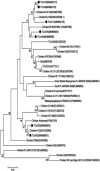Diagnosis of poult enteritis complex (PEC) and molecular detection of avian coronaviruses in some commercial turkey flocks in Iran
- PMID: 35126543
- PMCID: PMC8806176
- DOI: 10.22099/ijvr.2021.40378.5853
Diagnosis of poult enteritis complex (PEC) and molecular detection of avian coronaviruses in some commercial turkey flocks in Iran
Abstract
Background: Enteritis syndromes, also known as poult enteritis complex (PEC) with diverse etiologies, can affect turkey production. An avian coronavirus (AvCoV), turkey coronavirus (TCoV), is one of the most important viral causes of PEC in turkeys.
Aims: In the present study, the occurrence of PEC and the presence of AvCoV in some commercial turkey flocks were investigated.
Methods: PEC was diagnosed based on the history, clinical, and necropsy findings. A reverse transcriptase-polymerase chain reaction (RT-PCR) targeting the AvCoV nucleoprotein (N) gene was applied to detect the virus in the tissue samples. Cloacal swabs were collected from 11 flocks without a known history of PEC.
Results: PEC was diagnosed in six (16.2%) out of 37 investigated turkey flocks. The daily mortality rate in affected flocks ranged from 0.2 to 1.2%. Samples from 8 flocks out of 18 (44.4%) were positive for AvCoV. Four PEC affected flocks were positive for AvCoV. Seven positive samples were sequenced and phylogenetic analysis revealed the close relationship with previously characterized avian infectious bronchitis viruses (IBV).
Conclusion: The results suggested that PEC should be considered as a significant syndrome in the Iranian turkey industry. According to this preliminary study, it was shown that avian coronavirus infection is prevalent in commercial turkey farms of Iran. However, no causative association could be concluded between PEC occurrence and AvCoV infection in turkey flocks.
Keywords: Avian coronavirus; Poult enteritis; Turkey.
Conflict of interest statement
The authors declare that they have no conflict of interest.
Figures


References
-
- Akin A, Lin TL, Wu CC, Bryan TA, Hooper T, Schrader D. Nucleocapsid protein gene sequence analysis reveals close genomic relationship between turkey coronavirus and avian infectious bronchitis virus. Acta Virol. 2001;45:31–38. - PubMed
-
- Barnes HJ, Guy JS. Poult enteritis-mortality syndrome. In: Saif YM, Barnes HJ, Glisson JR, Fadly AM, McDougald LR, Swayne DE, editors. Diseases of poultry. Ames, Iowa State Press ; 2003. pp. 1171–1180.
-
- Barnes HJ, Guy JS, Vaillancourt JP. Poult enteritis complex. Rev. Sci. Tech. 2000;19:565–588. - PubMed
-
- Brown PA, Touzain F, Briand FX, Gouilh AM, Courtillon C, Allée C, Lemaitre E, De Boisséson C, Blanchard Y, Eterradossi N. First complete genome sequence of European turkey coronavirus suggests complex recombination history related with US turkey and guinea fowl coronaviruses. J. General Virol. 2016;97:110–120. - PMC - PubMed
LinkOut - more resources
Full Text Sources
